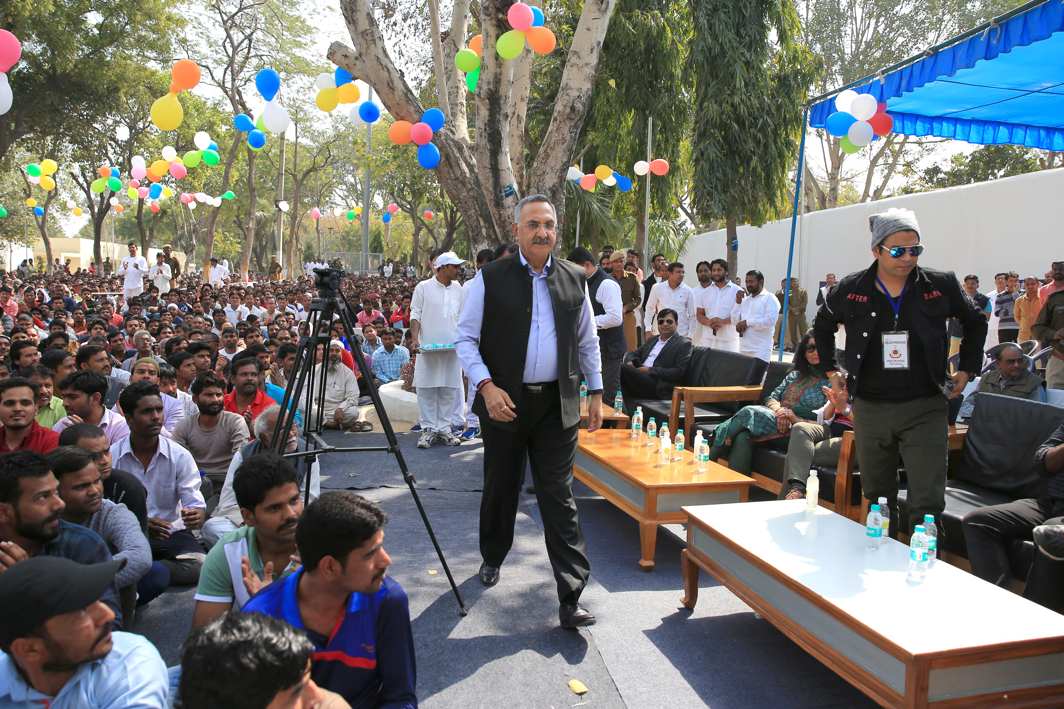Above: Singer Ankit Tiwari regaling the prisoners at a musical soiree in Tihar/Photo: Anil Shakya
The Tihar jail complex sees a ten percent rise in occupancy during winters as the food, blankets and medical treatment it provides are a big draw for petty criminals
~By Sujit Bhar
The Tihar Jail complex in west Delhi is not just the largest in South Asia, it is a veritable township with high walls encircling its many central jails. It is so large that it has its own director general of police and many other security systems. It also seems one of the most comfortable.
This correspondent had evidence of the comfort level when he visited this jail complex recently and was treated to delicious paratha and paneer sabzi as he spoke to officials there. He was told that this was the staple food for the inmates too.
“The jail does provide comfort,” said Additional Inspector General (AIG) Raj Kumar. “In fact, the population of this jail complex sees a rise of about ten percent every winter. It goes down again when winter wanes.” He explains: “In the harsh winters of Delhi, the jail provides its inmates a roof, food, blankets, security and even medical treatment.
As the mercury dips, many criminals intentionally commit petty crimes and surrender, ending up in Tihar where they spend a few months in comfort, get themselves treated and then walk out as the weather improves.”
CORRECTIONAL HOME
This jail is also regarded as one of the most effective correctional homes. Though it is still called a jail, Commandant Abhisekh Dixit terms it an ashram. Incidentally, other jails in India are slowly being renamed as correctional homes. Inmates learn to paint, get vocational training and venture into various vocations.

Tihar jail is run by the Department of Delhi Prisons, Government of Delhi, and has nine central prisons, with another one at Rohini Prison Complex. Managing this mammoth jail is not easy as it is very overcrowded.
While the sanctioned capacity of the nine jails (plus the Rohini Complex) is 6,250, the total number of inmates, as per data released in end-2015, was 14,183. This is 227 percent over the sanctioned capacity. Only four percent of the total inmates are women, while sadly, 80 percent are undertrials.
The jail authorities can do little to reduce this load, what with the sluggish legal system leading to pendency of cases. And though a large number of inmates have already got bail, they cannot leave as they have not been able to furnish money for their bail bonds. The Delhi High Court last year had lamented this fact.
RECREATIONAL ACTIVITY
However, jail officials do try to make the lives of these inmates meaningful and have many people who provide recreational activity inside the compound. This correspondent was witness to a musical soiree by three singers—Mandakini Bora, Ankit Tiwari and Dilbagh Singh—who achieved some fame in Bollywood. Their reception on the grounds of Central Jail No. 4 was stupendous. DG Ajay Kashyap came with his family and enjoyed the spirited show.
The complex also has an art centre where inmates have showed off their artistic abilities. The paintings displayed were of reasonable calibre, but it was poignant to see an installation with shoe lasts (forma).
The centre had a shoe-making unit, but due to the government’s new rules on tanneries and animal hides, it was shut down. This has deprived inmates of another opportunity to use their talent to find employment outside.
 Technically, it is possible for a jail inmate to support his family from his income in jail, said Raj Kumar. “The jail manufactures and markets several products such as cookies, bhajjis and clothes and these are marketed from its haat and elsewhere,” he said. “The inmates acquire these skills from experts inside the factories and get paid as per the Minimum Wages Act. They even make furniture which is in good demand outside. At the end of each month, the inmates can transfer their salaries to their home,” he said. “The total annual turnover from our factories is Rs 60 crore.”
Technically, it is possible for a jail inmate to support his family from his income in jail, said Raj Kumar. “The jail manufactures and markets several products such as cookies, bhajjis and clothes and these are marketed from its haat and elsewhere,” he said. “The inmates acquire these skills from experts inside the factories and get paid as per the Minimum Wages Act. They even make furniture which is in good demand outside. At the end of each month, the inmates can transfer their salaries to their home,” he said. “The total annual turnover from our factories is Rs 60 crore.”
Inmates who have “behaved well” are also rewarded and can become part-time and unpaid security personnel, supplementing the police inside. They can be seen inside standing guard with fibreglass canes.
The overall reform of Tihar jail was brought about by super cop Kiran Bedi when she headed the jail complex. It has never been the same again. Seeing the serene atmosphere inside, it is difficult for a commoner to visualise that some of the most dreaded criminals are lodged there. But then, there is no place like Tihar.


